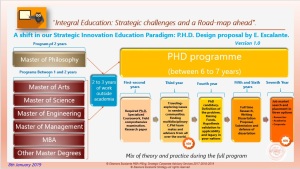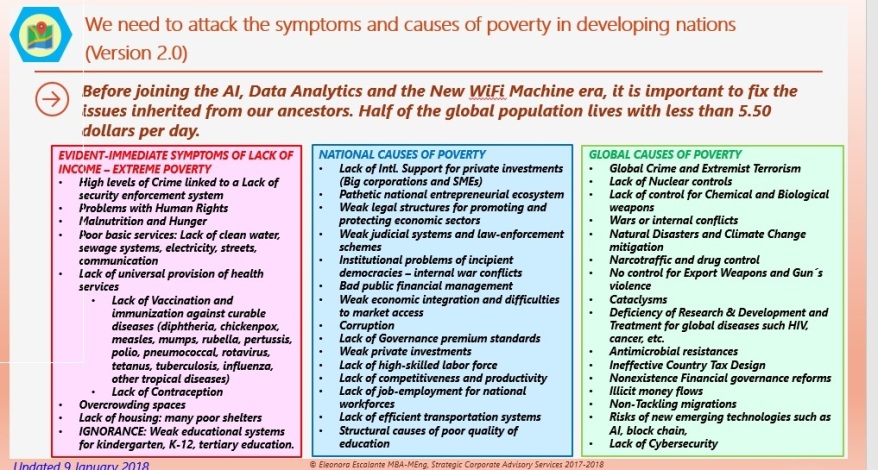Integral Education: Strategic Challenges and roadmap ahead (XXVI): A new design scheme for the Ph.D.Programme – Pros and Cons
Have a beautiful weekend. As promised previously, let me share with you a list of pros and cons I have prepared for our proposal of the Ph.D. program. As you can observe below, the Ph.D. or Doctor of Philosophy from a new perspective has to be expanded, not reduced. We are educating the new scientists of the future, scientists in every single discipline including arts) which will help us to solve all the issues we have inherited from our ancestors. Our new Ph.D.s need to be better than what we have now.
 There is a strong pressure to reduce funding to Ph.D. and universities have been looking for cheaper ways to educate people. That is why the open education has come into the table. In addition, many free or paid courses programs available online are also symptoms of this trend. But sincerely, open education without academic admission requirements is not enough. In our proposal, the fact that communication technology through the internet has helped to reduce timing, and information efforts are also more efficient doesn´t mean to reduce the number of years of the doctorate.
There is a strong pressure to reduce funding to Ph.D. and universities have been looking for cheaper ways to educate people. That is why the open education has come into the table. In addition, many free or paid courses programs available online are also symptoms of this trend. But sincerely, open education without academic admission requirements is not enough. In our proposal, the fact that communication technology through the internet has helped to reduce timing, and information efforts are also more efficient doesn´t mean to reduce the number of years of the doctorate.  It means we have an opportunity to transform knowledge into wisdom and evolve with it for the sake of fairness for all. This is an opportunity to put universities and scholars to solve the most delicate problems of our planet. We need a new Ph.D. model that will increase the possibility to contribute to humanity after the completion of the program. The whole idea of increasing the number of years is with the purpose to generate scientists in every single discipline with a new mental framework of practicality and academia. The whole idea of increasing the number of years to obtain a Ph.D. is with the purpose to reduce the number of years we have to wait for “good solutions” after their graduation. Ethics must be at the core of everything. Ethical Scientists of every single discipline at the service of humanity.
It means we have an opportunity to transform knowledge into wisdom and evolve with it for the sake of fairness for all. This is an opportunity to put universities and scholars to solve the most delicate problems of our planet. We need a new Ph.D. model that will increase the possibility to contribute to humanity after the completion of the program. The whole idea of increasing the number of years is with the purpose to generate scientists in every single discipline with a new mental framework of practicality and academia. The whole idea of increasing the number of years to obtain a Ph.D. is with the purpose to reduce the number of years we have to wait for “good solutions” after their graduation. Ethics must be at the core of everything. Ethical Scientists of every single discipline at the service of humanity.
I will repeat it: the Ph.D. is the foundation of science in every discipline (including arts). Without scientists we won´t be able to accurately solve all our issues inherited from our past ancestors, listed below:

Let´s start:
PROS of the Ph.D.s new model proposal from Eleonora Escalante Strategy:
- Applicability to solve issues in every single field, in every single market and country. The level of practicality of the Ph.D. will prepare scholars not just for an academic life but also for the research-problem solving requirements of the new millennium.
- The Ph.D. scholars are going to be the future scientists of the world to solve relevant issues in developed and developing or emerging economies. The areas of research won´t continue to be irrelevant to human´s dignity but will be focused at the service of the critical issues of human beings.
- The first two years will prepare the scholars in their own area of specialization. The next 4 years will be a fantastic opportunity to work with higher standards to solve problems with a scientific approach. In addition, within a group of multidisciplinary people, branches of learning, specialty universities, and advisors (not just academic but also practitioners of high level of erudition).
- This Ph.D. model evolution for the next generations is grounded in purpose beyond the process to accomplish it. The purpose of any type of education must be to help and serve others to fulfill their potential.
- There will be a huge shift from the discipline or field of studies to the nature of the challenge or enigma or issue to solve. For example, instead of a Ph.D. in African studies, there will be a Ph.D. in Competitiveness and Productivity for Africa. Or instead of a Ph.D. in Business Administration, there will be a Ph.D. in Entrepreneurship, or a Ph.D. in Global Logistics, or a Ph.D. in Digital Economy. Or instead of a Ph.D. in Government, there will be several programs of Ph.D. in public policy research/”the specific country in study”, or a Ph.D. in International Cooperation, or a Ph.D. in Philanthropy for Higher Education. Instead of a Ph.D. in Civil and Environment Engineering-Hydrology, there will be a Ph.D. in Water Provision, another one in Antipollution of the Ocean, etc.. Can you see the shift?
- Once the shift from a field of studies changes to an issue to solve, the multidisciplinary teams are required. The Ph.D. degree won´t be able to be realized by one person, but by several individuals from different backgrounds. These Ph.D. new programs will “nourish cross-disciplinary investigation and communication”
- It will trigger the “soft skills” learning: Actually, soft communication skills (teamwork, communication, cooperation, etc) will be taught by learning to interact with other scholars from other countries and universities. These skills will be empowered with the closeness to the communities where the problems are located. Communication across different departments and disciplines will be possible. Finally.
- Collaborative Approach: The design of the Ph.D. program will require a collaborative view, which will break the mold of the traditional approach. Since the range of issues of the planet is systemic, these issues must be addressed comprehensively and cooperatively between the private, public sector, philanthropists and universities. “It is important to realize that problems will never be solved as long as each institution continues to act independently”.
- “Prestige will be measured both within and beyond institutions by the number and purported strength of a department’s doctoral programs.”
- The competitive advantage of the Ph.D.s will be measured in relation to the real success of the solutions and its implementation by the scholars’ contributions. The participation of the private sector and philanthropists in research themes and higher education will trigger more financial funds for universities.
- The expansion of the Ph.D.s graduates is beyond the classrooms. Once the public and private sector leaders understand that Ph.D.s are scientists prepared to solve issues, the demand for them will rise. Public Sector scientists will be needed to do all the works that are now done by consultants. In governments, public researchers will be needed and from different disciplines. And they must be paid with six figures salaries accordingly.
CONS of the Ph.D.s new model proposal from Eleonora Escalante Strategy:
- This proposal is time-consuming and too long in duration. Many will not like to study more years. We know it. Currently, even though a Ph.D. program is advertised for 4-5 years, in the reality it takes on average between 7 to 9 years to be completed. Eleonora Escalante Strategy scheme requires two years more, because of the two previous years of the job experience requirement.
- There is a cost of opportunity to be considered. On average with this plan, Ph.D. will be graduating at 33 years old, ten years later than their peers, which only accomplished the Bachelor of Science or undergraduate degree. Particularly for women who wish to wait to finish their studies, and have babies before this age.
- Less independence during the years of study not just for the Ph.Ds. candidates but also for advisors.
- It requires cultural awareness and a certain degree of maturity of how to work with other international Ph.D. Students and authorities of different countries. Soft skills are crucial, and if scholars’ don´t have them, there is a high risk of not accomplishing the degree.
- Traveling is important, mostly for understanding the cultural aspects and details of the country where the problem is located. This Ph.D. scheme is very practical and goes beyond a lab, or from a university cubicle only. An investigation or research located in a country with corruption will be different than one located in one country with less rottenness.
- Funding issues are envisaged and need to be solved. 40% of Ph.D. candidates get some type of loans to finish their degree. There is a trend for a decline in public funds toward Ph.D. programs in universities, and the scholars will need to find their own sponsorships. The third year of my proposal is solely for fundraising and will secure the sustainability of their project. The public-private funds for educating Ph.D.s will be normal in the future.
- There is a need to find new models of financing Ph.D. projects beyond university funds: philanthropists, private foundations, corporate multinationals, multilaterals, international cooperation, governments, etc.
- Smaller Salaries risk may await. Research careers are precarious in many countries (public and private sector). The majority of entities, which hire researchers, diminish the position and salary to levels below of a secretarial administrative position. Why study so much, if the job market will not pay your value at the end of your degree? The structure of salaries for Ph.D.s has to change.
- It will require a mindset shift in every single potential institution (private or public), which hires Ph.D.’s. It is required a new institutional policy to foresee Ph.D. researchers as scientists, and how research will be performed and reported.
- “To reach a collaborative approach, students, administrators, trustees and even people from the public and private sectors must create pressure for this reform”.
- Not all will be available for all in one unique place. In addition, the new Ph.D.s model will require to re-adjust the structure of the Ph. Ds branding. Some universities will be better or recognized in producing excellent human capital to solve certain issues and other universities will be recognized by supplying human capital to the world to solve other issues.
This is all for today. Now is your turn, what do you think? At the end of the day, the Ph.D. is a personal choice. Let´s continue with this saga next week. Thank you.

Some sources quoted to write this article:

